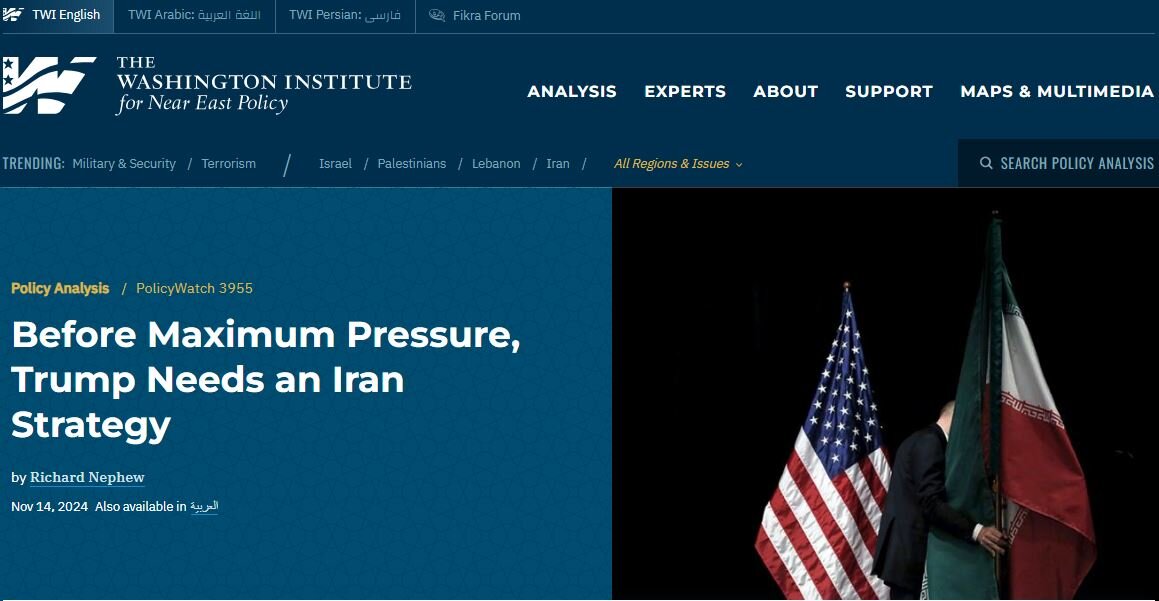U.S. ‘maximum pressure’ on Iran: beating a dead horse?

TEHRAN – U.S. President-elect Donald Trump's national security and foreign policy picks have fueled speculation about a renewed "maximum pressure" campaign against Iran.
In a recent Washington Institute for Near East Policy article, "Before Maximum Pressure, Trump Needs an Iran Strategy," Richard Nephew outlines potential scenarios for future U.S.-Iran relations.
The article tries its best to address the ‘maximum pressure’ flaws in Trump’s first term as president however it fails to give an alternative for the policy. It only advises Trump to keep the pressure on Iran but this time with a much more practical approach.
Axis of Resistance
Nephew argues that Iran's present strategic position could be more favorable for negotiations with the U.S. He states, "Iran being in a weaker position regionally after Israel's evisceration of Hezbollah and Hamas—could actually facilitate wide-ranging talks."
However, despite Nephew’s claims, the strength of Iran and its allied groups is still intact.
According to the Israeli army, nearly 50 soldiers have died in combat during ground operations in Southern Lebanon. The heavy toll comes as Israel pounds Beirut and has assassinated top Hezbollah leaders including the group’s late Secretary General Sayyad Hassan Nasrallah. Ground operations in Southern Lebanon have not brought any significant territorial gains for Israel and the regime in Tel Aviv has not yet achieved its goal of returning Israeli settlers up to the north of occupied Palestine.
Furthermore, Hezbollah’s missile and drone capabilities are still in place and it is continuously launching operations deep inside occupied Palestine including Tel Aviv.
In the Gaza front, Israel may have achieved some of its announced goals including the killing of the late Hamas leader, Yahya Sinwar but has failed to defeat the group in action.
The recent siege on Northern Gaza after occupying it once since the onslaught began on October 2023 shows the failure to contain Hamas in military terms in the coastal territory.
Hamas is still inflicting human losses on the Israeli military and the regime has no “day after” strategy for Gaza. Continued occupation of northern Gaza and building settlements there or appointing the Palestinian authority to rule Gaza is not practical due to previous operational failures just like in the 2000s.
On a third front, Ansarullah's Red Sea operations have disrupted trade routes to Israel. Despite the U.S.-led "Operation Prosperity Guardian," Yemeni drone and missile attacks on Israeli positions in the Occupied Territories continue unabated.
Moreover, the shadow of Iraqi Resistance operations against U.S. military bases in Iraq and Syria is still haunting Washington.
Crippling sanctions: reality or myth?
The focal point in Nephew’s approach to the ‘Maximum pressure’ policy is having a strategy for implementing the measures. However, he fails to address several issues including Tehran's ties with China and Russia properly. Since the first Trump presidency, Tehran has strengthened ties with these two nations.
These ties will complicate the efficacy of the Trump sanctions against Iran. Beijing and Tehran have signed a 25-year strategic agreement to boost ties, China is one of the main buyers of Iranian crude oil and trade ties have been expanding rapidly.
Also in geopolitical terms, any regional war in West Asia will hurt the Chinese economy which relies heavily on crude imported from the Persian Gulf. Beijing has been active in mediating between regional rivals and facilitated Tehran-Riyadh talks which excluded any U.S. influence. Beijing has also been vocal about Israeli crimes in the Gaza Strip calling for a ceasefire as well as mediating between Palestinian factions. Beijing in general, is against any major shift in the balance of power in West Asia.
Since the war in Ukraine, Moscow, and Iran have also expanded ties in various fields. The two countries have been working closely to counter U.S. sanctions and boost economic ties several MOUs have been signed and investment in the North-South Corridor has been increased. Long before the war in Ukraine the two countries had been militarily cooperating in Syria in their fight against terrorism. Both supported the Syrian government for the re-establishment of sovereignty over its territory. Further pressure by the U.S. and its allies on Tehran may result in further military cooperation including in Ukraine.
Iran’s membership in BRICS and Shanghai Cooperation Council has further helped the country to counter the U.S. “isolation” policy.
Failed once, will fail again
Maximum pressure against Iran has failed once in bringing it to the negotiating table.
Tehran has found ways to keep its economy going and unlike claims the sanctions have not resulted in a total collapse. “Regime change” attempts in Tehran have also led nowhere and proven to be an ineffective way to counter Iran’s moves in the region.
Reinforcing sanctions in order to mount pressure on Iran to halt support for the Resistance Axis continued in the first Trump presidency but to no avail.
The recent escalation between Iran-Israel and a possible full-scale war in the region seems farfetched due to global issues including U.S. concerns in other parts of the world. Washington’s rivalry with China and the war in Ukraine are much more pressing issues for the U.S.
Also, a limited operation by Israel against Iranian nuclear sites will only lead to an acceleration of change in Tehran’s nuclear doctrine. There is a growing voice in Iran that pushes for the militarization of the nuclear program.
